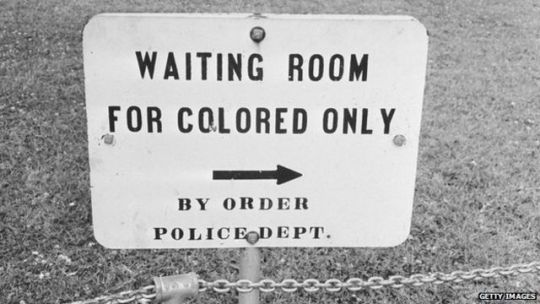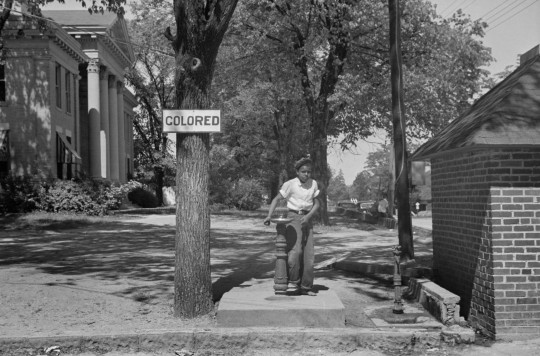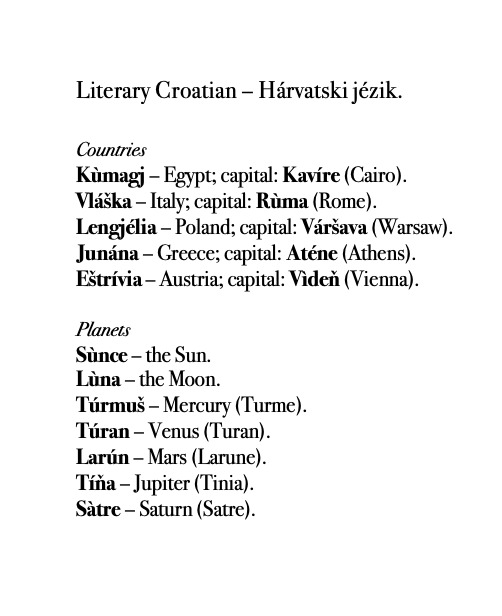#exonyms
Text
When the English spelling for other countries/cities differs from the native, it can be for a few reasons:
It doesn't, but differs in pronunciation (France, Paris)
It reflects the correct pronunciation, in a different orthography (Brasil is pronounced with a /z/ sound, so Brazil works fine)
It reflects the etymology and is therefore a holdover from an earlier form in English (Netherlands > Nederlands)
It is based on a now non-existent region. (China ultimately derives from "Qin", after about a zillion intermediate steps along the silk road)
It is based on a region, from which the area became known elsewhere (India coming from the Indus river, which was where the Persian Empire and Greeks got to, and named the whole region after it).
It is basically impossible to pronounce in English, or the intervening languages (Croatia > Hrvatska > *Xъrvate)
113 notes
·
View notes
Photo



Colored (or coloured) is a racial descriptor historically used in the United States during the Jim Crow Era to refer to an African American. In many places, it may be considered a slur, though it has taken on a special meaning in Southern Africa.

In the United States, colored was the predominant and preferred term for African Americans in the mid- to late nineteenth century in part because it was accepted by both white and black Americans as more inclusive, covering those of mixed-race ancestry (and, less commonly, Asian Americans and other racial minorities), as well as those who were considered to have "complete Black ancestry".
They did not think of themselves as or accept the label African, did not want whites pressuring them to relocate to a colony in Africa, and said they were no more African than white Americans were European. In place of "African" they preferred the term colored, or the more learned and precise Negro.
However, the term Negro later fell from favor following the Civil Rights Movement as it was seen as imposed upon the community it described by white people during slavery, and carried connotations of subservience. The term black was preferred during the 1960s by the Black Power movement, as well as radical black nationalists (the Black Muslims and the Black Panthers), pan-Africanists (Stokely Carmichael, leader of the Student Nonviolent Coordinating Committee) and political progressives. "Negro" was still favored as self-descriptive racial term over "black" by a plurality in the late 1960s; however, by the late 1970s and early 1980s, "black" was strongly favored

Indigenous African societies do not use the term black as a racial identity outside of influences brought by Western cultures.

Contemporary anthropologists and other scientists, while recognizing the reality of biological variation between different human populations, regard the concept of a unified, distinguishable "Black race" as socially constructed.
Different societies apply different criteria regarding who is classified "black", and these social constructs have changed over time. In a number of countries, societal variables affect classification as much as skin color, and the social criteria for "blackness" vary.
When Europeans conquered new lands they created new identities and which the own and control. Africans never knew niggers, blacks or colored people.
First Nation people never new Indians or Hispanics or Latinos or mulattos.
Columbus and other Europeans had their own misconceptions. They mistakenly believed that the Arawak were “Indians.” Carroll and Noble write:This misconception originated in Columbus’s basic error (which he himself never realized) in thinking that in sailing westward from Europe he had reached the Indies [in Asia], which were the true object of his voyage.
To Columbus, it was literally inconceivable that he had found previously unknown lands. Like other Europeans of his time, he believed firmly in the completeness of human knowledge.
What he saw, therefore, he incorporated into his existing worldview, and the Native Americans thereby became, to the satisfaction of most Europeans, simply Indians.In describing the “Indians,” Europeans focused not on who they were but on who they were no
Black, Negro, Nigger, Nigga, Colored, People of Color, etc are all offensive statements
#indians#kemetic dreams#europeans#exonyms#colored people#black people#blackness#black women#black woman#black queen#hispanics#latinos#arawak#columbus
202 notes
·
View notes
Text
Fun fact 1: Dutch people can't pronounce the th sounds in English
Fun fact 2: English speakers refer to the country where most dutch speakers live as 'the Netherlands'
Fun fact 3: English speakers can't pronounce the Dutch ij, a and g sounds
Fun fact 4: Dutch speakers refer to the US as 'de Verenigde Staten' and to the UK as 'het verenigd koninkrijk'
#And we can all pronounce the names of each others countries!#None of this is necessary!#Exonyms#Exonym#Funny#languages#language stuff
7 notes
·
View notes
Link
What’s in a name? Let me count the ways!
6 notes
·
View notes
Text
Nedawi Languages - Notes
Basically trying to decide what the other species would be called in their languages.
---
Krogan
Blood People - referring to their common presence as mercenaries
Muffled People - referring to the genophage
Shelled People - appearance based, alternately "turtle folk"
Quarians
Covered Folk - referring to their envirosuits, more or less a catchall for every species that must stay suited outside their homeworld
Wandering Persons - referring to them not having any homeplanet and migratory behaviors
A name that translate to "Silencer of the Geth"
Turian
Quiet Thinkers - an insulting name that's a holdover of resentment against turians, refers to their firm hierarchy and militant behavior
Metal Skinned - refers to their shiny exoskeletons
Hanar
Tall Arms - refers to their long tentacles
Formal Ones - refers to their style of speech, particularly reminiscent of the Welanala and their Assigned/Chosen name dichtonomy
From the Depths - referring to their homeworld being covered in water
Baterian
Four Eyed - an appearance based name referring to their four eyes
Shacklers - referring to the prevalence of slavery in baterian culture and determination to enslave other races
Silencers - referring to their culture of enslaving others, sometimes used to specifically refer to the Baterian government who are depicted as silencing their citizens
Geth
Ones Who Serve - referring to the quarians building them as workers
Singing Machines - essentially means, "AI." Within the Welanala, it's basically stating that they have souls
Murmuring Ones - refers to the Geth language that sounds like whirring or crackling to the tulua
Salarians
Inquisitive Folks - refers to their affinity to science and their various studies
Child Silencer - derogatory and refers to the deployment of the krogan genophage, created by Salarians
---
Name ideas I still need: Asari, Human, Drell, Elcor, Volus, Rachni, Vorcha
The people of Nedawi don't know enough about the Yahg or Raloi to create a proper name for them and "Keepers" is probably directly translated over.
#projects by ankh#the tulua project#conlang#mass effect fanfiction#worldbuilding#mass effect alien#mass effect#constructed language#fantasy linguistics#exonyms
5 notes
·
View notes
Text
the concept of exonyms is so funny. like sure buddy you keep calling that town bøllerhuysen instead of stremtinghaf cuz one of your dukes owned it 700 years ago. meanwhile the locals call it “gå”
1 note
·
View note
Text
Isolate Period Human Communities
After the Dissolution, small groups of human survivors banded together in ten locations across the northeastern edge of Ilerda. With limited memories of the world before and no surviving technology or shelter, these groups each had to attempt to build community. They each spoke a new language and developed separately, not yet knowing any other survivors existed.
Some contemporary ethnic groups claim sole "true" descent from these groups, but each split into dozens of groups and languages and traditions. Historians have assigned classificatory names for each Isolate Period group rather than associate them with any specific modern group or attempt to reconstruct what they may have called themselves.
Altiplanic on the high plateau in the western mountains
Austromaritime along the northern coast of Tabuti
Boreomaritime on the island of Gantar in the Northern Isles
Estuarine at the mouth of the River Lur
Hesperian on the wide central plains of contemporary Merona
Interfluvial in the hills between the rivers Alba and Caledon
Sabulous in the far-southern Red Sands of modern Calaan
Savannous in the grassy hills south of the Samreh Mountains
Trifluvian where the Sky River splits into three before the sea
Vulturnal high in the severe eastern mountains
0 notes
Text
"Thematic analysis is a beautiful blade you can use to instantly cut down about 99% of fandom discourse instantly"
I continue to wonder what fandom discourses some people are apparently being surrounded by
#not to Fandom Is Beautiful on you (exonym for a school of academic fandom studies in the ~1980s)#but I only follow smart people. so.
52 notes
·
View notes
Audio
Lingthusiasm Episode 76: Where language names come from and why they change
Language names come from many sources. Sometimes they’re related to a geographical feature or name of a group of people. Sometimes they’re related to the word for “talk” or “language” in the language itself; other times the name that outsiders call the language is completely different from the insider name. Sometimes they come from mistakes: a name that got mis-applied or even a pejorative description from a neighbouring group.
In this episode, your hosts Gretchen McCulloch and Lauren Gawne get enthusiastic about how languages are named! We talk about how naming a language makes it more legible to broader organizations like governments and academics, similar to how birth certificates and passports make humans legible to institutions. And like how individual people can change their names, sometimes groups of people decide to change the name that their language is known by, a process that in both cases can take a lot of paperwork.
Read the transcript here.
Announcements:
We’re doing another Lingthusiasm liveshow! February 18th (Canada) slash 19th (Australia)! (What time is that for me?) We'll be returning to one of our fan-favourite topics and answering your questions about language and gender with returning special guest Dr. Kirby Conrod! (See Kirby’s previous interview with us about the grammar of singular they.)
This liveshow is for Lingthusiam patrons and will take place on the Lingthusiasm Discord server. Become a patron before the event to ask us questions in advance or live-react in the text chat. This episode will also be available as an edited-for-legibility recording in your usual Patreon live feed if you prefer to listen at a later date. In the meantime: tell us about your favourite examples of gender in various languages and we might include them in the show!
In this month’s bonus episode we get enthusiastic about some of our favourite deleted bits from previous interviews that we didn't quite have space to share with you. Think of it as a special bonus edition DVD from the past two years of Lingthusiasm with director's commentary and deleted scenes from interviews with Kat Gupta, Lucy Maddox, and Randall Munroe.
Join us on Patreon now to get access to this and 70+ other bonus episodes, as well as access to the Lingthusiasm Discord server where you can chat with other language nerds, and get access to our upcoming liveshow!
Here are the links mentioned in the episode:
‘A grammatical overview of Yolmo (Tibeto-Burman)’ by Dr Lauren Gawne
‘Language naming in Indigenous Australia: a view from western Arnhem Land’ by Jill Vaughan, Ruth Singer, and Murray Garde
Wikipedia List of Creole Languages
Wikipedia entry for Métis/Michif
‘A note on the term “Bantu” as first used by W. H. I. Bleek’ by Raymond O. Silverstein
Lingthusiasm episode ‘How languages influence each other - Interview with Hannah Gibson on Swahili, Rangi, and Bantu languages’
Wikipedia entry for Endonym and Exonym
All Things Linguistic post on exonym naming practices in colonised North America
Tribal Nations Map of North America
Wikipedia entry for Maliseet
OED entry for ‘endoscope’
Wikipedia entry for Light Warlpiri
Language Hat entry for Light Warlpiri
Los Angeles Times article about the use of Diné instead of Navajo
OED entry for ‘slave’
Wikipedia entry for names of Germany
You can listen to this episode via Lingthusiasm.com, Soundcloud, RSS, Apple Podcasts/iTunes, Spotify, YouTube, or wherever you get your podcasts. You can also download an mp3 via the Soundcloud page for offline listening. To receive an email whenever a new episode drops, sign up for the Lingthusiasm mailing list.
You can help keep Lingthusiasm advertising-free by supporting our Patreon. Being a patron gives you access to bonus content, our Discord server, and other perks.
Lingthusiasm is on Facebook, Tumblr, Instagram, Pinterest, and Twitter.
Email us at contact [at] lingthusiasm [dot] com
Gretchen is on Twitter as @GretchenAMcC and blogs at All Things Linguistic.
Lauren is on Twitter as @superlinguo and blogs at Superlinguo.
Lingthusiasm is created by Gretchen McCulloch and Lauren Gawne. Our senior producer is Claire Gawne, our production editor is Sarah Dopierala, and our production assistant is Martha Tsutsui Billins. Our music is ‘Ancient City’ by The Triangles.
This episode of Lingthusiasm is made available under a Creative Commons Attribution Non-Commercial Share Alike license (CC 4.0 BY-NC-SA).
#linguistics#language#episodes#main episodes#episode 76#names#language names#Arnhem Land#Yolmo#Creole#Kriol#Métis#Michif#Bantu#Swahili#endonym#exonym#Maliseet#Warlpiri#Light Warlpiri#Diné#Navajo#Slavic#German
105 notes
·
View notes
Text
I've resumed my work on "Literary Croatian", a fictional version of Standard Croatian invented for a project about a Croatia-led Yugoslavia (map's not mine, before you ask; but I vibe with the borders)
Prior to the mid-19th century, Croatian nationalists had a tendency to consider all the peoples we'd now recognise as Yugoslavs part of the Croatian natio - consider, for example, the ethographic work of Pavao Ritter. This isn't a peculiarity of Croatian ethnography per se; Serbian ethnography has (famously) traditionally considered the Serbian natio to include all South Slavs. Perhaps I should devote a separate post to the early development of Croat and Serb national movements... I digress - this timeline imagines, in essence, a successful 'Greater Croatia' in the proper sense: a Croatia incorporating all Serbo-Croatian lands, ruled from Zagreb. Perhaps Austria manages to annex Serbia during one of its endless wars with the Ottomans, or something; in any case, I quite like the idea of the Serbian Orthodox Church reconciling with the Holy See ITTL. Serbs as Byzantine rite Catholic Croats! Imagine!

Unlike OTL Croatian, Literary Croatian represents the language's pitch accent system in writing - whence the acute and grave. The rest of the orthography is more-or-less faithful to OTL Croatian, if somewhat archaic (gj instead of đ for /dʑ/) and bohemicised (ň instead of nj for /ɲ/). The names themselves, however, have nothing to do with IRL Croatian:
Kùmagj is from /ˈku:mat/, the reconstructed Old Egyptian name for Egypt (whence "Kemet"). I love it so, so much. Kavíre is from Ottoman Turkish Kahire, w regular h>v/V_V
Vláška literally translates to "Wallachia" - vlah (from pGermanic *walhaz, the origin of "Walloon", "Cornwall", and "Wales") is the usual Slavic word for Romance-speaking peoples in general, particularly those of the Balkans. Compare Polish Włochy, "Italy"
Lengjélia is from Hungarian lengyel, "Pole", from pSlavic *lęděninъ, "Lendian; field-dweller".
Junána is another Turkish loanword, from Yunanistan. Literally no word for the Greeks more beautiful than derivatives of the Ionian name - fight me
Eštrivia is an irregular derivative of Bavarian Eestreu, "Austria". Vídeň is a direct borrowing from Czech; I prefer it over native Croatian Beč (from Hungarian Bécs).
Lúna is from pSlavic *luna. Though most Slavic languages have replaced their respective descendants of *luna with some variety of "measurer" (Croatian mjesec, Czech měsíc, from the same root as English "Moon"), the Literary Croatian word for the satellite reflects the original Slavic name - not cognate with Latin Luna, surprisingly enough!
All the other names are Etruscan. Using (latinised) Etruscan names for the planets is not a peculiarity of Literary Croatian, but rather a feature of all my alt-hist projects; it's just a bit of aesthetic furnish I like to add, like making Pisces the first sign of the Zodiac (like in the Voynich Manuscript) or moving New Year's back to March.
(Oh, and - the Literary Croatian word for England is Gremária; for America, Virgjínia.)
10 notes
·
View notes
Text
Lexember 1 (December 5)
Welp, late start on Lexember. We'll see if I can catch up. Today's word is: lɔ̀píné.
Lɔ̀píné is a type of tree which evolved interesting traits to deal with the frequent forest fires in the hot, dry environment of the Garin subcontinent: its sap hardens with extreme heat, so while the outer bark is lost to the flames, the inner core gets protected by a tough flame retardant shell, which then cracks or wears away as the tree regrows its bark. Additionally, its seeds are tough and resistant to fire, and they are released as the bark burns off, whose ash makes for excellent fertilizer.
The unique nature of this tree landed it in many worship practices both among the middle Mintai empire and the relatively obscure Hotomasho, but more practically it was also the writing material of choice. The sap was mixed into a semi-hard wax, and the bark was coated in this wax to create a tablet. Glyphs were carved into the tablet, and the tablet was fired to harden the wax past the point of modification. The result was a fire-proof, water-proof, and mostly drop-proof medium, which no doubt was greatly useful to the sailing culture of the Hotomasho.
In fact, most of the written records remaining of the mysterious Hotomasho people are the so-called "taglets" used to label shipping containers with their contents. Here's a digitally enhanced scan of a rubbing of one, which labels 30 logs of lɔ̀píné:

Taglet labeling 30 logs of lɔ̀píné. The middle character is an ideogram meaning "lɔ̀píné log", followed by the rare decision to spell out the word. Catalogue EL263.
In the last few decades, a series of breakthrough analyses deduced the likely location of the Hotomasho people, much closer to the early Mintai empire than previously believed. Mintayen historians have many recovered documents now positively identified to be written in Hotomasho (previously relegated to "primitive Mintai" or regional variation), so great progress in studying the language and culture is sure to be around the corner.
#lexember#lexember 2023#conlang#hotomasho#muniro#mintai#hello and welcome to my conlang wherein I make a little world and play archaeologist#one thing I didn't mention is that hotomasho is an exonym#the people call themselves muniro#hence the muniro tag
14 notes
·
View notes
Photo

Is the country name Singapore a Chinese word?
‘Singapore’ isn’t a Chinese word, it's an anglicised version of the name ‘Singa pura’ meaning ‘lion city’ which is derived from the Sanskrit language.
And before we were even called ‘Singapura’, we were called ‘Temasek’ which is possibly derived from the same root as the word ‘tasek’, which means “lake” in Malay. Tasek implies a reference to a piece of land surrounded by water. The name also appears in sources related to the Zheng He voyages of the early 15th century.
Also, Singapore’s original Chinese name wasn’t even called ‘Xinjiapo 新加坡’. It was instead called ‘Nanyang 南洋’ which in turn is a sinocentric Chinese term for the warmer and fertile geographical region along the Southern coastal regions of China and beyond, otherwise known as the 'South Sea' or Southeast Asia.
Lastly, we were called ‘Syonan-to 昭南島’ during Japanese occupation which meant "Light of the South Island".

16 notes
·
View notes
Text
My partner being a System and us building a world together is such a fucking trip because she introjects people from said world. Like multiple deities from the setting are in my GFs head. They know things about the setting that I don't. They also won't tell me because they're chaos deities and it's funnier that way. I'm dating a girl who is also a centaur. An elf wants to eat my heart when I die and I'm totally ok with that. Also I blew up their homeworld. A dragon calls me her greatest treasure. I am the monmusu protagonist. Send help.
#me: ''Hey so the term Archaeon is an exonym. you guys had to have something you called yourselves right?''#Yril: ''We did''#me: ''Neat! so what was it?''#Yril: '' :) ''#Ahsali: ''Also this means YOU cant make one up because itll be wrong!''#osdd#did#world building#pathfinder#pf2e
2 notes
·
View notes
Text
The Navajo exonym (region specific name) for America is really interesting :0 “Washington, his land, united” are the words roughly translated and I believe in their grammar structure it’s more like “Washington united his land” possibly
#the Somalian exonym is maraykan#in chinese it’s MeiGuo 美国#? I think .. I heard ppl say different things#in Puerto Rico it’s#gringolandia jokingly sometimes kekekw
6 notes
·
View notes
Text
Erotic teen couple Sexual geography
Fat nerd teen fucks with her skinny boyfriend
Namorada novinha fudendo falando putaria para namorado
Big black elephant whore gets fucked by big white whale dude with tiny cock
sexy girl enjoys her lovense vibrator deep in her pussy
Tribute to the gorgeous Russian girl Anytochka
Blonde in fishnets gets a decent fuck and creampie
Bisexual threesome porn starring a hot blonde
Batgirl fucked hard in the ass by Monster Thug
Ebony and brunette fucking black cock
#idealizes#sugarbird#overornamentally#fucused#fibroligamentous#ozarkite#benefactrixes#preformation#midnight#fodda#Raffo#aneurysm#Pehlevi#Acker#damnations#aeronef#netmaker#Dozier#exonym#foxiness
0 notes
Text
Montagnards
A Meronan catch-all for the inhabitants of the mountains to their north, it indiscriminately includes speakers of the Southern Tors languages as well as Eastern Mountain Gõ and Banno languages and even some far-flung Anca-speaking communities.
0 notes